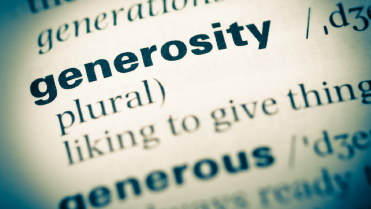THE BENEFITS OF GENEROSITY
Generosity — the quality of being kind and understanding, the willingness to give others things that have value — is often seen as an act of selflessness; however, studies are now showing that generosity is actually in your best interest. Being generous is a mental health principle, and it could be the very key to a happy and healthy life.
Year after year, more and more studies are highlighting the benefits of generosity on both our physical and mental health. Generosity both reduces stress, supports one’s physical health, enhances one’s sense of purpose, and naturally fights depression. It also increases one’s lifespan.
Generosity also develops social connection and improves relationships. According to Jason Marsh and Jill Suttie of the Greater Good Science Center, “When we give to others, we don’t only make them feel closer to us; we also feel closer to them.” This is because being generous and kind encourages us to understand others more positively.
Being generous also makes us feel better about ourselves. Generosity is both a natural confidence builder and keeps you away from hating your ownself. By focusing on what we are giving rather than on what we are taking, shifts our focus away from ourselves.
While maintaining a healthy level of self-awareness and sensitivity to oneself is important, too because we often see ourselves in a negative way. We spend too much time listening to the “critical inner voice” in our heads, which criticizes our every move and fills us with negative thoughts towards ourselves and others. These negative thoughts undermine our confidence and can lead to self-sabotage. Being generous keeps us away from the critical inner voice’s nasty thoughts and fights with it as well. When we see someone else benefiting from our kind actions, for instance, it is hard for the inner voice to argue that we are worthless.

